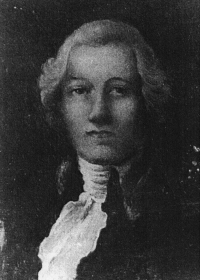The road from Oas to Yraga [Iriga] which I took on the 23rd of April by way of Polangui is not alike and quite different from the previous ones. Barren mountains covered with semi-calcined rocks and dried up land (crossed out words) too poor to make any seed productive, scarred by rugged ravines everywhere and frightening precipices, sadly remind the weary traveler of the lovely, luxuriant forests he had just passed by [which are] images of fertility that emerged from the Creator’s hands (the next words up to the end of the sentence were crossed out) harbors deep down the life-giving substances which it lavishes on the entire plant kingdom, refreshing the weakest plant to the most vigorous tree which in requital protects with its exuberant network of branches from the sun’s searing rays the benevolent womb to which it owes its existence.
Informed in Iriga of the proximity of the Negritos of the mountain, I provided for an escort of one armed man and two interpreters, determined to look for them and observe at close quarters this peaceful and unfortunate caste. I went through some forests teeming with papayas, coconuts, guavas but waterless. At a short distance, we encountered one of them: middle-aged, sporting a loincloth and armed with a lance, bow and arrows, some of which were poisoned. His young wife, not entirely wanting in the charms of her sex, accompanied him. My gift and kindness quieted down the discomposure that they manifested at seeing us and won for me their trust. After some moments, they led me to one of their rancherias a little distant, where the women and children were under the care of only one armed man. I gave some presents to every one and asked various questions which they answered smartly and promptly.
Apparently they do not have an idea of a Creator or any kind of divinity and, consequently, any worship or religious belief. They suffer few infirmities but I observed that some women were full of scaly skin rash very common in the women of the Marianas. They are monogamous and, in their marital union, they respect blood relationship. Their marriages consist merely in the union of the contracting parties without some ceremony or practice prior to the consent of the bride’s parents. Their childbirths are a little painful and susceptible to fatal consequences. They wash themselves immediately after in the nearest river without suffering any ill effect.
They like tuba to the excess which they extract from palm stalks and let it ferment until it acquires the strength of an alcoholic drink and tobacco which they grow in the mountains and smoke without curing in spite of the persecutions they have suffered from the officials of this agency since the establishment of its monopoly. The guavas, coconuts, papayas and bananas that they gather in these valleys make up their ordinary fare to which they use to add some wild boar or deer that they catch with their dogs or kill with arrow shots.
They inter their dead in the most remote places of the mountains, setting beside the corpse food, arms and the rest of the furniture used by the deceased.
A large part of these miserables previously worked in nearby haciendas, benefitting greatly the owners, but the difficulty in supplying them with more than sufficient quantity of tobacco which they need, since the establishment of the monopoly has deprived them of this means, which had also the advantage of making them fulfill a contract [and] imperceptibly bringing them close to a less barbaric condition and inducing them to take to farming that would make their existence less miserable and insecure.
My curiosity partly satisfied, I made my way to Nabua a league away west of Iriga. The interminable fields, for the most part flat, are planted to rice that is well cared for and [arranged] in a pleasant symmetry. The prized nito hats are made in this industrious and devoted pueblo, where everywhere are seen cloth fabrics called cambray, which they weave (blotted words) but are known to be of good quality and much durability. There are different kinds, some very thin and of tolerably good taste. The soil is very fertile but somewhat treeless. No white mulberry trees or useful plants are seen but some small cacao trees with little hope of progress.
